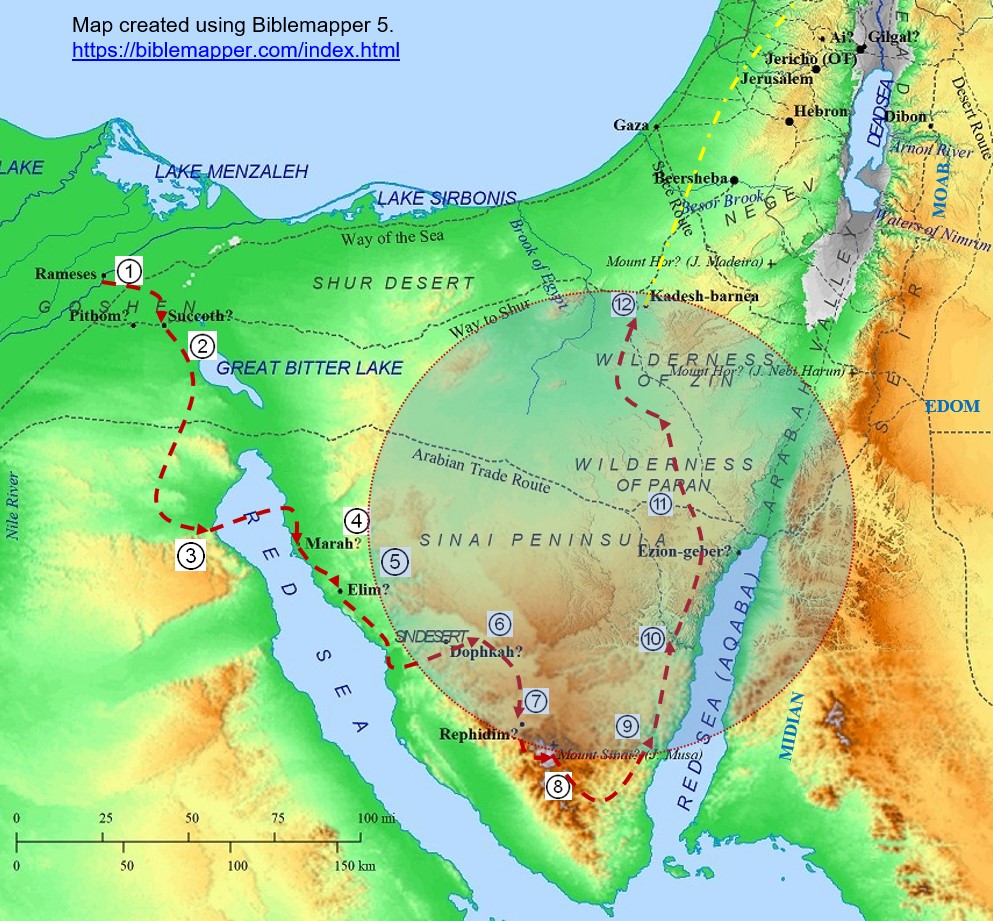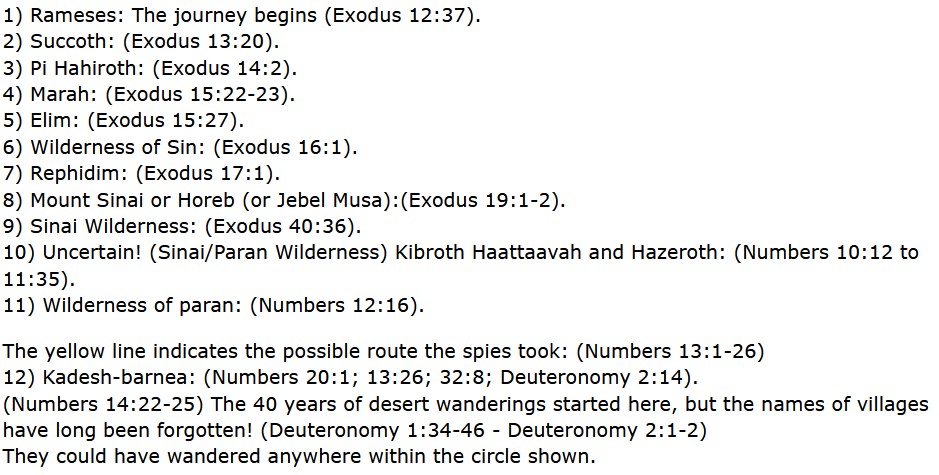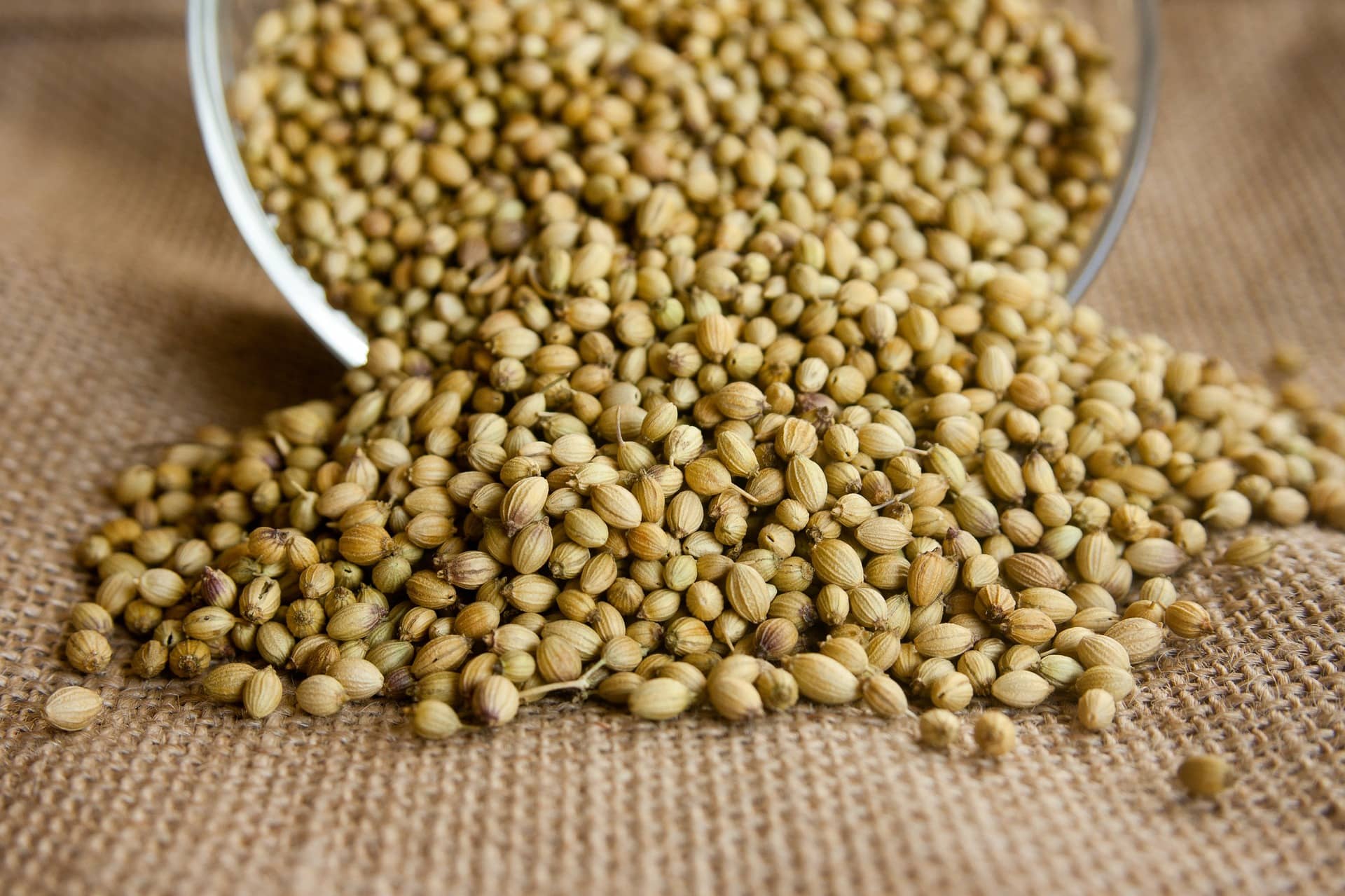Read Exodus 15:19-27
We looked at the song of praise that starts this chapter in the last study. But here we have a recap: verses 19-21
19 When Pharaoh’s horses, chariots and horsemen went into the sea, the Lord brought the waters of the sea back over them, but the Israelites walked through the sea on dry ground. 20 Then Miriam the prophet, Aaron’s sister, took a tambourine in her hand, and all the women followed her, with tambourines and dancing. 21 Miriam sang to them:
‘Sing to the Lord,
for he is highly exalted.
Both horse and driver
he has hurled into the sea.’
(No more is heard of Miriam’s prophetic gift until Numbers chapter 12.)
We now move with the Israelites into the desert, initially still heading towards Canaan.
Exodus Route map 1 and
key


22 Then Moses led Israel from the Red Sea and they went into the Desert of Shur. For three days they travelled in the desert without finding water. 23 When they came to Marah, they could not drink its water because it was bitter. (That is why the place is called Marah.)
Again, it could be anywhere! But note the waters were bitter, and certainly undrinkable. (It may be that the waters were contaminated with natron, mineral salts which naturally occur in Egypt – it was used by them for embalming bodies)
24 So the people grumbled against Moses, saying, ‘What are we to drink?’
It seems the people still had a mind-set that was expecting the worse, and grumbling when it happened. The major miracle from God that had taken them through the Red Sea three days ago had now been forgotten.
The people, and Moses, had different ways of dealing with problems. What were they?
V24 ‘the people grumbled’
V25 ‘Moses cried out to the Lord’
What is our response to problems?
25 Then Moses cried out to the Lord, and the Lord showed him a piece of wood. He threw it into the water, and the water became fit to drink.
(Some versions have ‘Tree’. The same Hebrew word is used in the Bible for both ‘tree’ and ‘wood’. The ‘tree’ has been compared with the cross of Jesus and the purifying that it brings.)
Here was a miracle. Nothing was physically capable of changing a large body of water from bitter to drinkable!
So now we have to ask: why lead the Israelites to undrinkable water, and then perform a miracle to change it? The Lord explains:
There the Lord issued a ruling and instruction for them and put them to the test. 26 He said, ‘If you listen carefully to the Lord your God and do what is right in his eyes, if you pay attention to his commands and keep all his decrees, I will not bring on you any of the diseases I brought on the Egyptians, for I am the Lord, who heals you.’
Note firstly that Moses, as representative of the people, had to be obedient. Then the Lord would act. So he now explains that if the people too are obedient, he will in future act on behalf of his people.
But notice in v25 ‘put them to the test’ and also look at the ifs in verse 26. This was to be a most difficult lesson for the people to learn.
Do we find it any easier to ‘listen carefully to the Lord your God and do what is right in his eyes’ and ‘pay attention to his commands’?
As if to demonstrate, the Lord then led them to ‘good water’.
27 Then they came to Elim, where there were twelve springs and seventy palm trees, and they camped there near the water.
You can almost hear the people saying ‘that’s better’ as they settled down under the palm trees! But it was not to last . . . .
Read Exodus 16:1-36
1 The whole Israelite community set out from Elim and came to the Desert of Sin, which is between Elim and Sinai, on the fifteenth day of the second month after they had come out of Egypt.
It is now a month since the Israelites left Egypt. They were travelling in a south-easterly direction, parallel and on the east side of the Gulf of Suez, and Numbers 33:10 tells us that they camped by the shore of the Red Sea after they had left Elim and before reaching the Desert of Sin.
(The Desert or wilderness of Sin (or Zin) is not thought to relate specifically to our modern word ‘sin’ but may have its origins in the Moon-god ‘Sin’ which was worshipped in that area. It is also connected to the name Sinai given to whole peninsula and the mountain of God. However, it was an area where the Israelites sinned!)
2 In the desert the whole community grumbled against Moses and Aaron. 3 The Israelites said to them, ‘If only we had died by the Lord’s hand in Egypt! There we sat round pots of meat and ate all the food we wanted, but you have brought us out into this desert to starve this entire assembly to death.’
It was actually the presence of the Lord in the pillar of cloud by day, and fire by night had led them. If the Lord was leading, why grumble against Moses ‘you have brought us out into this desert to starve this entire assembly to death’?
It’s so easy to grumble about Ministers (Vicars, Priests etc.) even though we know they are God’s servants, carrying out God’s instructions as best they can. And yet in any other situation, if we had a problem with a worker, wouldn’t we want to complain direct to their employer?
So what’s the difference?
Few would risk grumbling against the Lord himself! Although that is exactly what we are doing when we grumble about his servants (verse 8b)
The Israelites thought they had taken sufficient supplies with them for the journey from Egypt to Canaan (a distance of about 200 miles). At most it should have taken no more than twenty days. But the Lord had other ideas. He knew their hearts (Exodus 13:17-18) so he took them into the wilderness to begin their education! (They also had flocks and herds of animals. They could have begun to slaughter them, but they were their only source of future income and they intended to preserve them until they reached the Promised Land)
The first lesson was that before he could begin to provide for the people they had to stop relying on their own supplies. Another lesson (which they probably missed) was that the Lord was amazingly patient towards his people.
4 Then the Lord said to Moses, ‘I will rain down bread from heaven for you. The people are to go out each day and gather enough for that day. In this way I will test them and see whether they will follow my instructions. 5 On the sixth day they are to prepare what they bring in, and that is to be twice as much as they gather on the other days.’
The miraculous provision of food (for the next forty years) would be a daily reminder that the people were being led and provided for by the Lord himself. If they had any complaints they could take them to him!
6 So Moses and Aaron said to all the Israelites, ‘In the evening you will know that it was the Lord who brought you out of Egypt, 7 and in the morning you will see the glory of the Lord, because he has heard your grumbling against him. Who are we, that you should grumble against us?’ 8 Moses also said, ‘You will know that it was the Lord when he gives you meat to eat in the evening and all the bread you want in the morning, because he has heard your grumbling against him. Who are we? You are not grumbling against us, but against the Lord.’ 9 Then Moses told Aaron, ‘Say to the entire Israelite community, “Come before the Lord, for he has heard your grumbling.”’
For his part, Moses appears quite upset that the people should grumble about him (grumbling appears 5 times in the last 3 verses). But more than that, he was upset that the people should presume to grumble against the Lord God himself.
What was meant by ‘Come before the Lord, for he has heard your grumbling’ in verse 9?
It feels as if Moses is saying (through Aaron) ‘The Lord has heard your grumbling and understands you have a complaint. He has made an appointment for you: you can see him now. Come with me’.
10 While Aaron was speaking to the whole Israelite community, they looked towards the desert, and there was the glory of the Lord appearing in the cloud.
This wasn’t just a bright cloud. It was awesome, and everyone was well aware they were standing in the presence of the Almighty. (I guess they were then in no mood to grumble!)
11 The Lord said to Moses, 12 ‘I have heard the grumbling of the Israelites. Tell them, “At twilight you will eat meat, and in the morning you will be filled with bread. Then you will know that I am the Lord your God.”’
13 That evening quail came and covered the camp, and in the morning there was a layer of dew around the camp.
It’s interesting that the arrival of hundreds of thousands of quail, just waiting to be caught, doesn’t get much comment. Perhaps it could be explained away as one of those freaks of nature. But the Manna was different.
14 When the dew was gone, thin flakes like frost on the ground appeared on the desert floor. 15 When the Israelites saw it, they said to each other, ‘What is it?’ For they did not know what it was.
Moses said to them, ‘It is the bread the Lord has given you to eat. 16 This is what the Lord has commanded: “Everyone is to gather as much as they need. Take an omer for each person you have in your tent.”’
There have been many fanciful suggestions put forward to explain what manna could have been. None bear scrutiny as a likely daily occurrence (except Sundays!) over forty years, in all the different places they travelled to. The Israelites called it ‘what is it?’ and whatsit sounds good enough to me!
 Coriander seed.
Coriander seed.
The only description we have is Exodus 16:31 ‘It was white like coriander seed and tasted like wafers made with honey’
And Numbers 11:7-8 ‘The manna was like coriander seed and looked like resin. 8 The people went around gathering it, and then ground it in a hand-mill or crushed it in a mortar. They cooked it in a pot or made it into loaves. And it tasted like something made with olive oil’
17 The Israelites did as they were told; some gathered much, some little. 18 And when they measured it by the omer, the one who gathered much did not have too much, and the one who gathered little did not have too little. Everyone had gathered just as much as they needed.
19 Then Moses said to them, ‘No one is to keep any of it until morning.’
20 However, some of them paid no attention to Moses; they kept part of it until morning, but it was full of maggots and began to smell. So Moses was angry with them.
In any group of people we could come across those who are generally obedient to authority, and those who are not, and every variation between.
I also think that while everyone is lumped together as ‘grumblers’, there must also have been those who had believed each of the miracles as being from God, and who were by now prepared to trust the Lord completely.
21 Each morning everyone gathered as much as they needed, and when the sun grew hot, it melted away. 22 On the sixth day, they gathered twice as much – two omers for each person – and the leaders of the community came and reported this to Moses.
In verse 18 we are told that simply gathering Manna was all the people needed to do. However much they collected would be enough. But now they discovered that on Friday they had twice what they would need. Why? What had happened? People were confused and so they asked their leaders. They in turn went to Moses.
So far there had been no Sabbath laws given so it would not be obvious to anyone, so Moses had to explain:
23 He said to them, ‘This is what the Lord commanded: “Tomorrow is to be a day of sabbath rest, a holy sabbath to the Lord. So bake what you want to bake and boil what you want to boil. Save whatever is left and keep it until morning.”’
24 So they saved it until morning, as Moses commanded, and it did not stink or get maggots in it. 25 ‘Eat it today,’ Moses said, ‘because today is a sabbath to the Lord. You will not find any of it on the ground today. 26 Six days you are to gather it, but on the seventh day, the Sabbath, there will not be any.’
A simple instruction and an amazing provision from the lord.
27 Nevertheless, some of the people went out on the seventh day to gather it, but they found none. 28 Then the Lord said to Moses, ‘How long will you refuse to keep my commands and my instructions? 29 Bear in mind that the Lord has given you the Sabbath; that is why on the sixth day he gives you bread for two days. Everyone is to stay where they are on the seventh day; no one is to go out.’ 30 So the people rested on the seventh day.
As we saw earlier, there will always be someone who disobeys! But here we are introduced to the idea of resting on the Sabbath. This will be expanded later. For now it will be sufficient for the people to recognise that the seventh day was to be different.
This was a totally new idea - during the last 400 years as slaves in Egypt, I'm sure they never had any days off!
31 The people of Israel called the bread manna. It was white like coriander seed and tasted like wafers made with honey. 32 Moses said, ‘This is what the Lord has commanded: “Take an omer of manna and keep it for the generations to come, so they can see the bread I gave you to eat in the wilderness when I brought you out of Egypt.”’
33 So Moses said to Aaron, ‘Take a jar and put an omer of manna in it. Then place it before the Lord to be kept for the generations to come.’
He did as he was told, and then, when Moses had been given the Ten Commandments,
34 As the Lord commanded Moses, Aaron put the manna with the tablets of the covenant law, that it might be preserved. 35 The Israelites ate manna for forty years, until they came to a land that was settled; they ate manna until they reached the border of Canaan.
36 (An omer is one tenth of an ephah.) (Roughly 4 pints or 2 litres)






